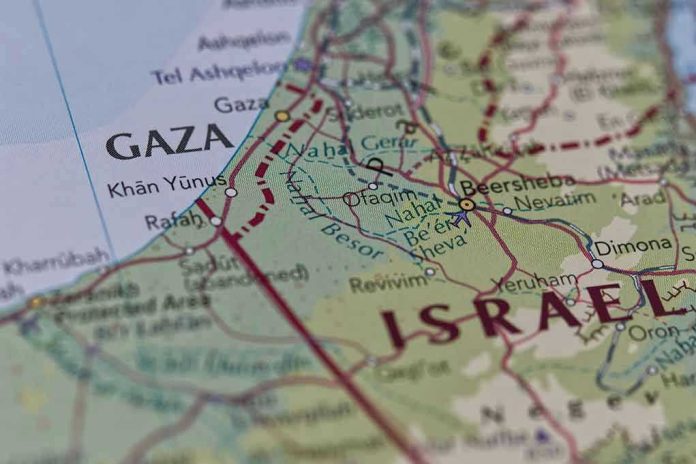
As Israel readies a sweeping military offensive in Gaza City, plans for mass civilian displacement and field hospitals expose the massive scale of humanitarian and geopolitical fallout—testing the limits of international law and the world’s patience.
Story Snapshot
- Israeli military prepares to seize Gaza City while constructing additional field hospitals for displaced civilians.
- Up to 800,000 Palestinians face evacuation amid continued airstrikes and devastated healthcare infrastructure.
- Global condemnation intensifies, with the UN and major governments warning of violations and humanitarian disaster.
- Israel’s dual push—military escalation and aid—raises doubts about civilian safety and long-term stability.
Dual Military and Humanitarian Strategy in Gaza
The Israeli Defense Forces are finalizing plans for a large-scale offensive to capture Gaza City, a densely populated urban center that has become a focal point in the ongoing conflict. Simultaneously, Israeli authorities are mobilizing humanitarian resources, including constructing new field hospitals and expanding tent accommodations, to manage the anticipated displacement of up to 800,000 civilians. This approach aims to combine military objectives with a public show of humanitarian concern, though questions remain about the adequacy and sincerity of these support measures.
Preparations for this operation follow the August 8 approval by the Israeli cabinet for expanded military activities targeting Gaza City, with the official announcement of mass movement plans on August 17. The situation escalated after previous ceasefire breakdowns and continued hostage situations involving Hamas. Past offensives in Gaza, such as those in 2014 and 2021, resulted in widespread displacement, civilian casualties, and international backlash, and the current operation appears poised to surpass those in both scale and impact. The healthcare system in Gaza is already near collapse, with humanitarian access severely restricted by ongoing hostilities and blockade.
International Response and Legal Controversy
The international community has responded with strong condemnation of Israel’s plans, raising concerns about potential violations of international law, forced displacement, and the risk of starvation and further humanitarian catastrophe. The United Nations Security Council, along with organizations like Amnesty International and foreign governments, have warned that the operation could create an “unprecedented” crisis, emphasizing the dangers of mass displacement and the destruction of what little remains of Gaza’s infrastructure. Israeli leaders, including Prime Minister Netanyahu and Defense Minister Katz, frame the operation as necessary for security and hostage recovery, but their assurances of humanitarian support have done little to allay fears among global observers and aid organizations.
While Israel claims to be expanding humanitarian support, ongoing airstrikes have caused civilian casualties even in areas designated as safe zones. There is no clear timeline for evacuation, and the logistics of safely moving and caring for such a large population remain uncertain. International governments, including France and Turkey, have called for an immediate ceasefire, the protection of civilians, and a return to diplomatic negotiations. Many experts argue that the dual approach—military escalation paired with increased humanitarian aid—does not adequately address the risks facing civilians, nor does it comply with legal or ethical standards set by the global community.
Implications for Gaza, the Region, and U.S. Interests
The immediate impact of Israel’s offensive will be the displacement of up to 800,000 Palestinians, straining already devastated healthcare, infrastructure, and aid delivery systems. Humanitarian organizations warn of increased casualties, economic collapse, and social fragmentation. In the long term, the entrenchment of Israeli military occupation and ongoing instability threaten to undermine prospects for a two-state solution or lasting peace. The situation also adds fuel to global debates about the protection of national borders, government overreach, and the defense of constitutional and humanitarian values—issues that resonate with American conservatives concerned about sovereignty, security, and the dangers of unchecked international agendas.
IDF Plans to Capture Gaza City, Prepares Construction of Field Hospitals for Evacuated Civilians https://t.co/4I2EX3Sw51
— Joe Honest Truth (@JoeHonestTruth) August 18, 2025
For U.S. readers, the crisis underscores the importance of strong national defense, strict border control, and policies that prioritize the safety and well-being of citizens over globalist pressures. The scale of displacement and humanitarian need in Gaza serves as a stark reminder of what happens when governments lose control of their borders and allow instability to fester. As the international community debates accountability and aid, many will look to America’s response as a sign of where the nation stands on fundamental values of liberty, security, and the rule of law.
Sources:
Israel prepares to move Palestinians to southern Gaza amid expanded military operations
UN Security Council discusses humanitarian crisis as Israel expands Gaza operations
Israel must rescind decision to take control of Gaza City and entrench its military occupation
Israel/Palestinian Territories – Further extension of Israeli military operations














